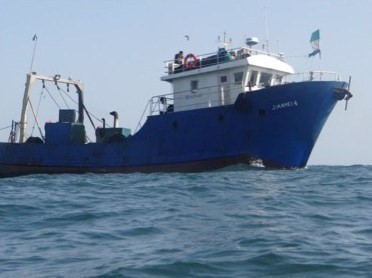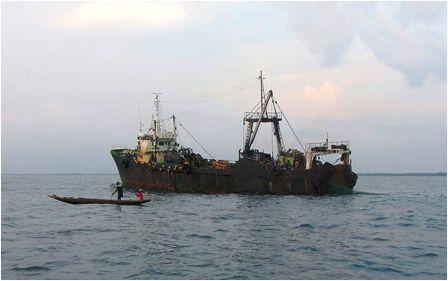Fisheries stakeholders trained on monitoring, control & surveillance
The West Africa Regional Fisheries Project of the Ministry of Fisheries and Marine Resources, on Tuesday, July 26th 2011 undertook a one day training exercise on Monitoring, Control and Surveillance for stakeholders in the sector. The training exercise was particularly conducted for Joint Maritime Committee (JMC) staff on Monitoring, Control and Surveillance. The strengthening of the MCS in Sierra Leone is part of one of the core components of the WAFRP Project in Sierra Leone which is reduction in illegal fishing.
The project will support the strengthening of the Monitoring, Control and Surveillance (MCS) system of Sierra Leone and the West African Sub region to reduce illegal, unregulated and unreported (IUU) fishing and ensure that industrial fishing operations are carried out within the provisions of the laws of Sierra Leone.
Held at the Joint Maritime Committee at Murray town, Freetown, the training session attracted participants from the Sierra Leone Police, the Sierra Leone Navy, Ministry of Fisheries official and representatives from the West Africa Regional Fisheries Project in Sierra Leone.
Speaking at the opening session, the Head of the Joint Maritime Committee, Tommy D K Taylor of the Fisheries Ministry explained that JMC is a civilian lead committee that is comprised of representatives from the National Revenue Authority (NRA), Office of National Security (ONS), Immigration, Ministry of Fisheries and Marine Resources, Sierra Leone Maritime Administration (SLMA) and the Sierra Leone Port Authority (SLPA), among others. The objective of JMC, he said, is to establish total control of Sierra Leone waters by protecting it from illegal, unregulated and unreported fishing activities. He said the JMC is also charged with the responsibility of ensuring safety at sea and the prevention of drug trafficking.
Government revenue, Taylor said, can be enhanced and increased through the fisheries sector as according to him “the fisheries sector is vital to Sierra Lone in terms of provision of protein, ensuring more revenue for the government and enough exchange rates in the country…” The training exercise, he went on, is an indication of government’s commitment for a robust JMC in the country. MCS, he said, is a management tool in the fisheries sector and therefore encouraged participants to work towards a better goal. Tommy D K Taylor ended by commending the West Africa Regional Fisheries Project (WARFP-SL) for facilitating such trainings.
In his statement, Project Coordinator for the West Africa Regional Fisheries Project, Dr. Sallieu Sankoh expressed delight for the training and informed participants that the MCS Consultant is “in Sierra Leone to help build and develop the skills and manpower of Sierra Leoneans to manage the country’s fisheries sector well…”
He also stated that the training is a first step towards series of activities and as such encouraged all to contribute to the training session with an open mind and at the same time interact with the MCS Consultant. The WARFP-SL, Dr.Sankoh said, aims at strengthening the fisheries sector in Sierra Leone through major components and that the training exercise is part of the objectives of the WARFP-SL.
Statement was also made by the Monitoring, Control and Surveillance (MCS) Consultant, Andy Read, who commended the Minister of Fisheries for being supportive to his work. He called on all to contribute to the development of a strategy for MCS in Sierra Leone.
By John Baimba Sesay, Communications Specialist, WARFP-SL
Stay with Sierra Express Media, for your trusted place in news!
© 2011, https:. All rights reserved.







